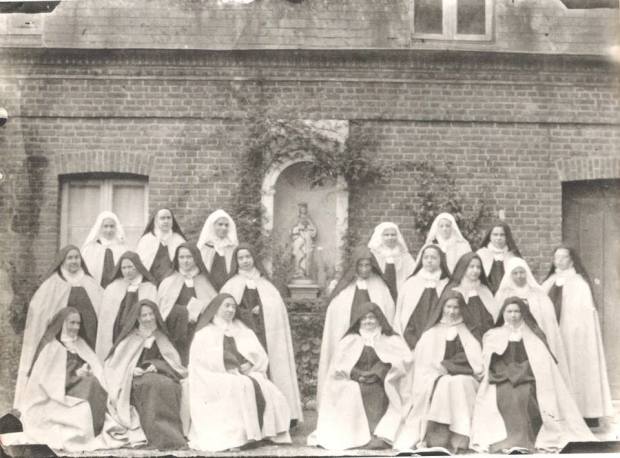Lenten Campaign 2025
This content is free of charge, as are all our articles.
Support us with a donation that is tax-deductible and enable us to continue to reach millions of readers.
No information on transverberation has appeared so far in the biographies of the famous French Carmelite nun St. Thérèse of the Child Jesus. However, in the published testimonies of her beatification process this extraordinary event is described in great detail.
Thérèse Martin's beatification process
According to the pre-conciliar legislation, the process of beatification of Thérèse Martin consisted of several parts.
These included: the examination of the candidate's writings, the ordinary process of inquiries regarding her reputation for sanctity, the process to verify the absence of unauthorized public worship of this person, and the process to prove her heroic virtues.
The complete set of documents of the process was never published.
But in 1973, on the occasion of the centenary of the birth of St. Thérèse of Lisieux, the Teresianum of Rome decided to publish, in French, two volumes of the Acts of the process of beatification and canonization of St. Thérèse of the Child Jesus and of the Holy Face.
Testimonies of people who knew her personally
The first of these documents — unique and priceless — are drawn up on the basis of the so-called witness questionnaires.
They are testimonies of the informative process that took place in Lisieux in 1910-1911, just 13 years after the death of Thérèse. At that time 48 witnesses were questioned, among them 26 persons who knew Thérèse personally. They spoke of her reputation for holiness and of the miracles that began to occur immediately after her death.
Among the 26 people who testified as witnesses to Thérèse's life were, of course, her own sisters. Of particular interest is the testimony of Mother Agnes of Jesus (Marie Pauline Martin), the second of the nine children of the holy spouses Zelie and Louis.
'Story of a Soul' and the testimony of Marie Pauline Martin
Mother Agnes was a Carmelite, like her sister, and several times served as prioress in the convent of Lisieux. From 1923, after her papal appointment, she served as prioress for life, until her death in 1951.
In December 1894, she ordered Thérèse to write down the memories of her childhood, and it is to her that we owe the writing of Story of a Soul. After Thérèse's death, it was Mother Agnes who immediately decided to publish these notes. It was also thanks to her that the first edition of Story of a Soul appeared on the first anniversary of Thérèse's death.
During the informative process she testified on two occasions, in August and September 1910. In them she stressed that she loved Thérèse not only as her own sister — although this was, of course, a source of joy and pride — but above all as a person who loved God. "I pray to her a lot, not because she is my sister, but because of her holiness," she said.
Wounded with love, but tested by disbelief
In one of the testimonies, Mother Agnes recounts a situation that took place two years before St. Thérèse's death:
In 1895, when I was prioress, she spoke to me of a mystical grace which she called "the wound of love."
At that time the good Lord, no doubt, allowed me to test her, since I didn’t give it any importance. I even gave the impression that I didn’t believe it, and I confess that I didn’t.
Reflecting on what she had told me afterwards, I wondered how I could have doubted her statement even for a moment. Yet I did not say a word to her about it until her last illness.
"The Seraph’s assault"
Two years later, shortly before her sister's death, the case haunted her. She asked boldly, and Thérèse, with her typical simplicity, answered Mother, who remembers it thus:
Then, in 1897, I wanted her to repeat to me in the infirmary what she had told me in 1895 about this wound of love.
Then she looked at me with a tender smile and said: 'My Mother, I told this to my Mother that very day and my Mother hardly listened to me.
When I expressed my regret for this, she repeated: "My Mother did not hurt me, I only thought that the good God allowed it for my greater good," Thérèse admitted, as simple as ever.
After a while, she related in detail the event that is often called the Seraph’s assault, after St. John of the Cross, who taught that a soul inflamed with love for God is assaulted internally by a Seraph. In these cases, a fiery angel pierces the person’s heart with an arrowhead or a spear ignited by the fire of love.
Such a situation occurs when the human soul is completely immersed in love, and is drawn by this love into an intimate union with God.

Thérèse of the Child Jesus wounded by a fiery arrow
"It was a few days after I had offered myself to Merciful Love," Sister Thérèse told her mother superior, Agnes. And before she died, St. Thérèse related:
I was beginning to do the Way of the Cross in the choir when suddenly I was wounded by an arrow of fire so full of heat that I thought I was going to die.
I don't know how to express this burning. There is no comparison to understand the intensity of this flame from Heaven. One second more and I would surely be dead.Besides, my mother, the saints have felt it many times. We read it in their biographies; Mother knows it well. I felt it only once in my life, and the dryness returned to my heart very quickly.
You could say that I spent my whole religious life in this dryness. I rarely had any consolation, nor did I ever long for it. On the contrary, I was very proud that the good Lord did concern himself with me.
Supernatural graces have never attracted me. I preferred to repeat to the good God, “It’s not my desire to see you here on earth.”











